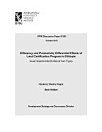Reverse-Share-Tenancy and Marshallian Inefficiency: Landowners Bargaining Power and Sharecroppers Productivity
Hosaena Ghebru Hagos · Stein T. Holden
mai. de 2013 · IFPRI Discussion Paper Livro 1 · Intl Food Policy Res Inst
E-book
48
Páginas
family_home
Qualificado
info
reportAs notas e avaliações não são verificadas Saiba mais
Sobre este e-book
While there are ample empirical studies that claim the potential disincentive effects of sharecropping arrangements, the existing literature is shallow in explaining why share tenancy contracts are prevalent and diffusing in many developing countries. Using a unique tenant-landlord matched dataset from the Tigray region of Ethiopia, we are able to show how the tenants strategic response to the varying economic and tenure-security status of the landlords can explain sharecroppers productivity differentials. To the best of our knowledge, this is the first study to use tenantlandlord matched data that accounts for both the supply (landlord) and demand (tenant) side characteristics in analyzing sharecroppers level of effort and productivity. The study reveals that sharecroppers yields are significantly lower on plots leased from landlords who are non-kin, who are female, who have lower income-generating opportunity, and who are tenure insecure than on plots leased from landlords with the opposite characteristics. While, on aggregate, the results show no significant efficiency loss on kin-operated sharecropped plots, more decomposed analyses indicate strong evidence of Marshallian inefficiency on kin-operated plots leased from landlords with weaker bargaining power and higher tenure insecurity. This study thus shows how failure to control for the heterogeneity of landowners characteristics can explain the lack of clarity in the existing empirical literature on the extent of moral hazard problems in sharecropping contracts.
Avaliar este e-book
Diga o que você achou
Informações de leitura
Smartphones e tablets
Instale o app Google Play Livros para Android e iPad/iPhone. Ele sincroniza automaticamente com sua conta e permite ler on-line ou off-line, o que você preferir.
Laptops e computadores
Você pode ouvir audiolivros comprados no Google Play usando o navegador da Web do seu computador.
eReaders e outros dispositivos
Para ler em dispositivos de e-ink como os e-readers Kobo, é necessário fazer o download e transferir um arquivo para o aparelho. Siga as instruções detalhadas da Central de Ajuda se quiser transferir arquivos para os e-readers compatíveis.








